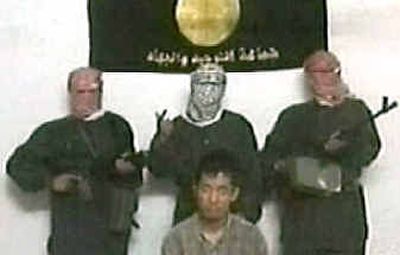Al Qaeda-linked group threatens to behead South Korean hostage

BAGHDAD, Iraq – Attackers lying in wait for Iraqi troops detonated a roadside bomb on the dangerous road leading to Baghdad’s airport Sunday, killing two Iraqi soldiers and wounding 11.
American troops took the Iraqi wounded to a U.S. aid station and waited while they were treated. Iraqi soldiers wept and hugged their U.S. comrades.
Elsewhere, U.S. forces clashed with insurgents in Samarra, striking back with helicopter gunships after guerrillas fired mortars into a residential neighborhood. U.S. 1st Infantry Division spokesman Maj. Neal O’Brien said at least four insurgents were killed.
Also Sunday, the Arab satellite TV network Al-Jazeera aired a videotape purportedly from al Qaeda-linked militants showing a South Korean hostage begging for his life and pleading with his government to withdraw troops from Iraq.
The kidnappers identified themselves as belonging to a group led by Abu Musab al-Zarqawi, who claimed responsibility for the videotaped beheading of American businessman Nicholas Berg. A statement presented by armed, masked militants on the video gave South Korea 24 hours from Sunday night to meet its demand or “we will send you the head of this Korean.”
In the videotape of the South Korean hostage, the militants identified themselves as belonging to Monotheism and Jihad, a group believed to be led by al-Zarqawi.
The video came two days after news of the beheading of American hostage Paul Johnson by al Qaeda-linked militants in Saudi Arabia, and an announcement Friday by South Korea that it will send 3,000 soldiers to northern Iraq beginning in early August. Once the deployment is complete, South Korea will be the largest coalition partner in Iraq after the United States and Britain.
In Baqouba, 35 miles northeast of Baghdad, insurgents fired mortar shells into a residential area, striking a home and killing a husband and wife, Iraqi authorities said.
The U.S. military said an American Marine was killed in action Saturday in Anbar province, which includes Ramadi and Fallujah. A mortar round also injured six police and four Iraqis in a separate attack Sunday near the Iraqi central bank in Baghdad.
Late Sunday, shooting erupted behind the Palestine Hotel, headquarters of several international news organizations. Hotel guards returned fire, and U.S. troops took positions around the compound near the circle where Saddam Hussein’s statue was hauled down in April 2003.
In southern Iraq, a blast and gunfire were heard early Monday in the central district of Samawah, where Japanese troops are based, Japan’s Kyodo news service reported.
Repairs continued on two key pipelines that transport crude oil to offshore terminals in the south, prolonging Iraq’s absence from the market, a coalition spokesman said Sunday.
Iraqi oil officials had predicted that crude exports would resume Sunday and had said repairs on the smaller of the two key oil arteries were completed. But coalition spokesman Dominic D’Angelo said that was inaccurate and that an estimate of when partial exports could resume was not available.
U.S. soldiers accompanying the Iraqis on the airport road said the Americans had just passed a traffic circle with the Iraqis behind them when assailants triggered the bomb.
“The hard-core terrorists don’t care who they kill,” said Lt. Col. Tim Ryan, commander of the 2nd Battalion, 12th Cavalry Regiment. “These guys are bigger targets than we are now.”
Insurgents have hammered Iraqi security forces to discourage volunteers from bolstering security forces straining to create stability before the interim government assumes power June 30.
Interim Prime Minister Iyad Allawi appealed Sunday for international help for his beleaguered forces and said the government was considering “emergency law” in unspecified regions.
Such measures could be imposed on the Sunni stronghold of Fallujah, where an American airstrike Saturday leveled a building that U.S. officials said was a suspected safehouse for the network of al-Zarqawi, a Jordanian-born militant believed to be linked to al Qaeda. At least 16 people were killed in the strike.
A senior officer of the U.S.-backed Fallujah Brigade disputed the American contention, saying Sunday that rescue operations uncovered only the belongings of women and children.
“Through our inspection in the ruins, we could see clothes and stuff of women and children,” Col. Mohammed Awad said. “There was no sign that foreigners have lived in the house.”
Fallujah Mayor Mahmoud Ibrahim al-Juraisi met Sunday with local leaders and assured them he would sever relations with the Americans because of the airstrike, according to an official, Ahmed al-Dulaimi.
The difference in U.S. and Iraqi assessments of the attack could strain relations between the Americans and the Iraqi security force established last month to take responsibility for law and order in Fallujah after the end of the three-week Marine siege.